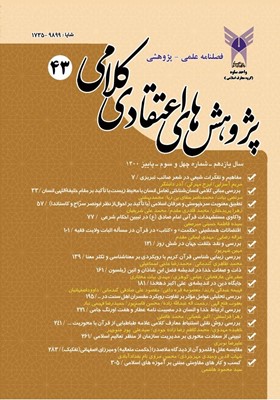ذات و صفات خدا در اندیشه فضل ابن شاذان و اتین ژیلسون
محورهای موضوعی : کلام تطبیقیصفرعلی عارفخانی 1 , عباس گوهری 2 , مهدی بیات مختاری 3
1 - دانشگاه آزاد اسلامی تهران
2 - دلنشگاه آزاد
3 - گروه علوم وقرآن حدیث ، واحد نیشابور
کلید واژه: ذات وصفات خدا, فضل ابن شاذان, اتین ژیلسون,
چکیده مقاله :
مسئله خداشناسی ازدغدغههای بنیادي انسان است. نقش اساسي این مفهوم ونحوه باوربه وجودیاعدم وجودخدادرهمه ابعادزندگي انسان آشكاراست،ونگرش ملحدانه نسبت به خدااست كه ماهیت هستي انسان رابهطور عام ومعناي آزادي ومسئولیت اخلاقي اورابهطورخاص،تعیین میکند. لذاشناخت ذات وصفات الهی از مهم ترین مباحث کلامی است که اندیشمندان فارغ ازروشهاومبانی فکری هریک درباره آن گفتگووابرازعقیده کردهاند.در این راستاپژوهش حاضر که به روش کتابخانه ای و اسنادی انجام گرفته به بررسی و مقایسه دیدگاههای فضل ابن شاذان و اتین ژیلسون در خصوص ذات و صفات خدا میپردازد. نتایج این تحقیق نشان داد که بین دیدگاه ژیلسون به عنوان یک فیلسوف نوتومائی و فضل ابن شاذان به عنوان یک متکلم شیعی که تفکرات فلسفی او در مورد ذات و صفات خداوند مشابه فیلسوفان مشاءاست، نقاط اشتراک فراوانی وجود دارد. از اشتراکات آنان روش یکسان فلسفی ایشان؛یعنی روش بهره گیری از عقل در استدلال هایشان و عقیده یکسان آنها در سازگاری عقل و دین است که باوجود اختلافاتی در نحوه بیان مطالب ، موجب اشتراک عقیده شده است.
The issue of theology is one of the fundamental concerns of man. The essential role of this concept and the way of believing in the existence or non-existence of God is obvious in all aspects of human life, and it is the atheistic attitude towards God that determines the nature of human existence in general and the meaning of freedom and moral responsibility in particular. Therefore, the knowledge of the nature of divine attributes is one of the most important theological topics that thinkers have discussed and discussed about it, regardless of their methods and intellectual foundation. God pays. The results of this study showed that there are many similarities between Gilson's view as a Neutomai philosopher and Fadl Ibn Shazan as a Shiite theologian whose philosophical thoughts on the nature and attributes of God are similar to those of the Peripatetic philosophers. One of their commonalities is their same philosophical method, that is, the method of using reason in their arguments and their same opinion in the compatibility of reason and religion, which, despite differences in the way of expressing the content, has caused the common opinion.
